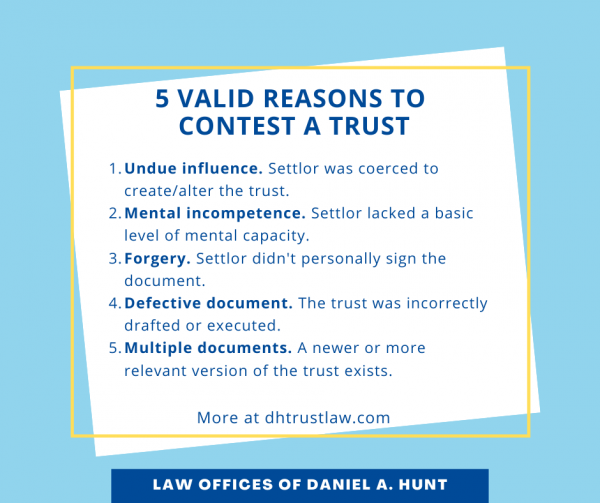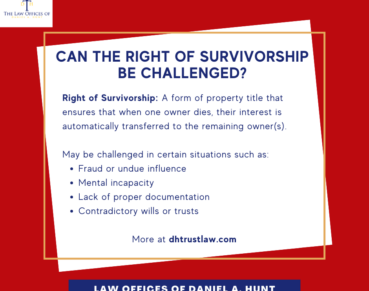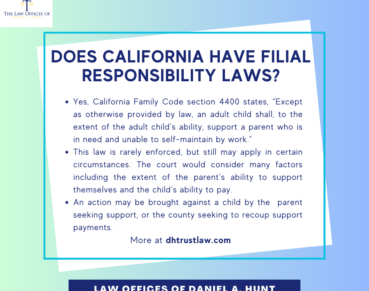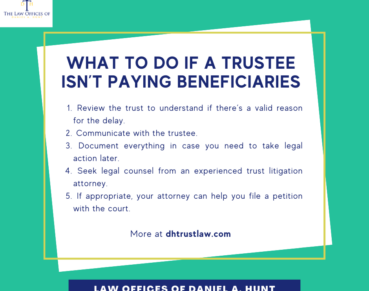How to Contest a Trust in California

If your loved one recently died and you feel concerned about the way their estate plan was executed or amended, you may be wondering how to contest a trust in California. A trust contest is a form of trust litigation that centers on the validity of the document itself or the manner in which it was created or altered.
Who Can Contest a California Trust?
In order to contest an estate plan, you must have the legal standing to do so. California law holds that only an interested party may challenge a trust or will. An interested party is someone who stands to inherit from the estate, including:
- Beneficiaries listed in the distribution section of the trust or will OR
- The Settlor’s “heirs at law“ (meaning relatives who stand to inherit under California intestacy laws)
Valid Reasons to Contest a Trust
The contesting party typically bears the burden of proof in a trust contest. This means that they must effectively demonstrate to a judge in a court trial that the trust instrument was created in an illegitimate manner. The exception to this rule would be if they are able to shift the burden of proof.
Here are 5 valid reasons to contest a trust in California:
- Mental Incompetence. The settlor was mentally incompetent at the time they created or updated their trust. The bar for mental competence in estate planning is fairly low. As long as a settlor understands the nature of their assets and who will receive those assets upon their death, they can legally create or update their estate plan.
Proving the settlor lacked mental capacity at the time they executed their trust often requires medical doctors to testify that the settlor lacked the most basic level of mental capacity at the time they signed the document. The incapacity may be due to severe mental illness, dementia, or serious substance abuse. - Undue influence. Sometimes an elderly person will decide to leave a significant portion or all of their estate to a professional or family caregiver or a new romantic interest. In situations like these, you may be able to contest a trust on the basis of “undue influence”. The California Welfare and Institutions Code defines undue influence as “excessive persuasion that causes another person to act or refrain from acting by overcoming that person’s free will and results in inequity.”
According to the Code, evidence of a victim’s vulnerability “may include, but is not limited to, incapacity, illness, disability, injury, age, education, impaired cognitive function, emotional distress, isolation, or dependency where the influencer knew of, or should have known of, the alleged victim’s vulnerability.” In order to win a trust contest, a beneficiary would need to prove that someone took advantage of the settlor’s vulnerability by inducing them to change their estate plan to profit themself. - Forgery. The signature on the trust document must belong to the settlor. It cannot be signed by a third party on behalf of the settlor. In order to win a forgery accusation, you would need to prove that the signature on the document did not belong to the settlor. This would likely involve handwriting analysis and testimony from a handwriting expert witness.
- Defect in the document. California trusts must meet certain requirements in order to be considered legally executed. If there was something unlawful about the way in which the document was drafted or executed, you may be able to successfully contest it. For example, the trust should be signed and dated by the settlor(s) and two unrelated, disinterested witnesses (who don’t stand to inherit) should have been present and signed the will.
- Multiple documents. If the settlor created multiple versions of a trust and/or amendments, you may be able to contest an older document if you know a newer document exists.
When to Contest a Trust
After the death of the settlor, the successor trustee must send out a notice to the trust beneficiaries within 60 days of the date of death. This notice provides basic details concerning the trust administration process and how to request a copy of the trust.
This notice also triggers a statute of limitations, or deadline to contest the trust, under the California Probate Code. Beneficiaries have 120 days after the date this notice was mailed out, or 60 days from the date a copy of the trust is delivered to them, to contest the trust (whichever date is later).
What About the No-Contest Clause?
Many revocable trusts have a “no-contest clause”, a section of the trust document intended to prohibit anyone from challenging or overturning the trust in court after the settlor’s death. A no-contest clause generally states that anyone who contests the trust will be disinherited.
Should you still contest a trust if it contains a no-contest clause? If the trust or amendment you are contesting disinherited you anyway, then you may not have much to lose by contesting the trust as far as losing an inheritance. If you have a strong case and stand to inherit a large sum if you can overturn the trust, it may be worth the cost of the legal battle.
Also, if you have “probable cause”, meaning a valid reason to contest the trust, the no-contest clause will probably not be enforced against you. Consult with an experienced trust litigator for counsel on your personal circumstances.
How to Contest a Trust in California
To contest a trust, your first step will be to find an experienced trust litigation lawyer to represent you. In your initial consultation, the attorney will likely want to review the trust document if you have it and any evidence you may have to support your claim. They can then offer their opinion on your likelihood of success and lay out options going forward.
If you don’t have access to all of the evidence yet, that’s ok. The attorney you hire can likely obtain a copy of the decedent’s estate planning documents and subpoena supporting evidence such as financial or medical records.
Overturning a trust can be challenging, but it is possible if you possess solid evidence that the document was created or updated in an illegitimate manner. If you have any questions on how to contest a trust in California, feel free to contact our law firm.
Law Offices of Daniel A. Hunt
The Law Offices of Daniel A. Hunt is a California law firm specializing in Estate Planning; Trust Administration & Litigation; Probate; and Conservatorships. We've helped over 10,000 clients find peace of mind. We serve clients throughout the greater Sacramento region and the state of California.




